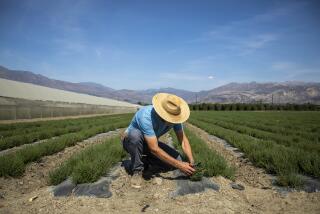Like Topsoil, Farmers’ Ethics Erode : Morality: The difference between right and wrong isn’t as clear-cut as it used to be, observers say. Economic problems and bureaucracy get much of the blame.
- Share via
NORTH BRANCH, Minn. — The moral lapses of the 1980s were not confined to executive suites, trading pits or political back rooms. There was backsliding in the cornfield too, farming observers say.
“The older fellows had a definite sense of right or wrong,” said Burt Peterson, proprietor of Peterson’s North Branch Mill. “Their word was their bond. Now, that’s not true. They’ll walk away from a deal.”
Peterson, 80, has served as a sounding board for farmers in the 30 years he has owned the mill in eastern Minnesota. He sees a slipping standard of agricultural ethics that he blames on “too dang much bureaucracy.”
“The restrictions and paper work are getting so tough, the farmers are saying, ‘I can no longer run my farm anymore. The government wants to run it for me,’ and they get discouraged,” he said.
Some experts agree with Peterson. Others point to frustrations over shrinking profit margins and ever-increasing environmental concerns.
Whatever the causes, questions of right and wrong have become a growing concern to many farmers trying to cope with debt restructuring, livestock welfare, pesticide use, crop-insurance regulations and a host of other situations.
“Between themselves, you’ll find farmers are totally honest,” said Cy Carpenter of Bloomington, former president of the National Farmers Union.
“But in terms of operating the farm as a business, you’ll find their ethics have changed greatly.”
Farm Futures magazine posed several ethical dilemmas to its 205,000 readers last year. In January, it reported that 59% of 900 farmers who responded believed ethical standards had declined in the last 10 years.
Many conceded that their own ethics have deteriorated. More than a third agreed with this statement: “It would be impossible to make a living if farmers followed all the rules and regulations made in Washington.”
Senior editor Bryce Knorr was surprised that “people thought the situation was as bad as it was. We were also disturbed that people reported seeing ethical violations so often--at least several times a year.”
More than 40% agreed it would be acceptable to claim tax depreciation on a pickup truck that a son was using at college most of the year, or to omit a $100 rebate from a herbicide company in reporting taxable income.
And only 70% said they would notify proper authorities if a pesticide were spilled into a creek, while 19% said they would wait and see if problems developed; 9% said they would take no action.
Most often, the farmers blamed a decay in agricultural ethics on “bad examples from Washington.”
The survey found that many of the same farmers who said Washington set the ethical standard also admitted that the IRS and government farm program presented them with their toughest ethical choices.
Policies emanating from Washington have angered farmers. They see their political power base shrinking, and many believe their interests are being savaged by people who understand little about a barnyard.
“Farm programs are changed midstream. They most often favor the super-big and super-rich,” Carpenter said. “The programs are not implemented as written, and that causes an attitude of disrespect on the part of farmers.”
Said Howard Schmid, a wheat farmer from Oberon, N.D.: “There’s no question there is a reaction. When you get pushed, you tend to push back.”
The economic plight of many farmers hasn’t helped their ethics either. As thousands of farmers lose their property in foreclosure and are forced off the land, some of those still in business say they’re more apt to make questionable ethical calls just to keep what they have.
“I see farmers wanting to be able to do the right thing, and they know pretty much the ethically right thing to do,” said Tom Ruehr, who teaches agricultural ethics at California Polytechnic.
“But many of them are feeling squeezed by economic pressures to take a shortcut, and that tends to slide them into unethical practices.”
Many farmers maintain that deteriorating ethics are an unavoidable byproduct of the hard times they face.
“It’s human nature for people to keep from getting themselves backed up against a wall,” said Richard Lunz, a cash-crop farmer near Fairmont. “It makes people do things they normally wouldn’t be able to live with.”
Said Burkhardt: “I don’t know whether farmers themselves are any less ethical (than their forebears). They probably have, in many respects, the same values that their grandparents did, but the system has changed. The business has become more competitive. There are lots of regulations and programs that they’ve got to negotiate through to make a living.”
According to the magazine survey, farmers believe the ethical choices they confront are indeed thornier than those earlier generations faced. Many cited mounting public concerns over agricultural damage to the environment.
“Expectations about farmers in the environmental sphere are much higher than they were a couple of decades ago,” said Jeffrey Burkhardt, director of the ethics and policy studies program at the University of Florida. As examples, he cited the growing alarm about pesticides’ effect on ground water and the call for wetlands preservation.
Carpenter said there’s bound to be conflict between farmers and environmentalists.
“The good environmentalist has the same objective as the farmer--to preserve the land,” he said. “But the farmer feels he’s being imposed upon and . . . he feels it’s an infringement on his family operation and his business.”
Carpenter insists that farmers remain as moral as any group in the nation. If the family farmer eventually is overrun by corporate enterprise, he said, America’s values will be forever altered.
“Farming has always been seen as the ideal. If corporate agriculture takes over, you lose that whole sense of community. We will lose a national treasure.”
More to Read
Inside the business of entertainment
The Wide Shot brings you news, analysis and insights on everything from streaming wars to production — and what it all means for the future.
You may occasionally receive promotional content from the Los Angeles Times.










